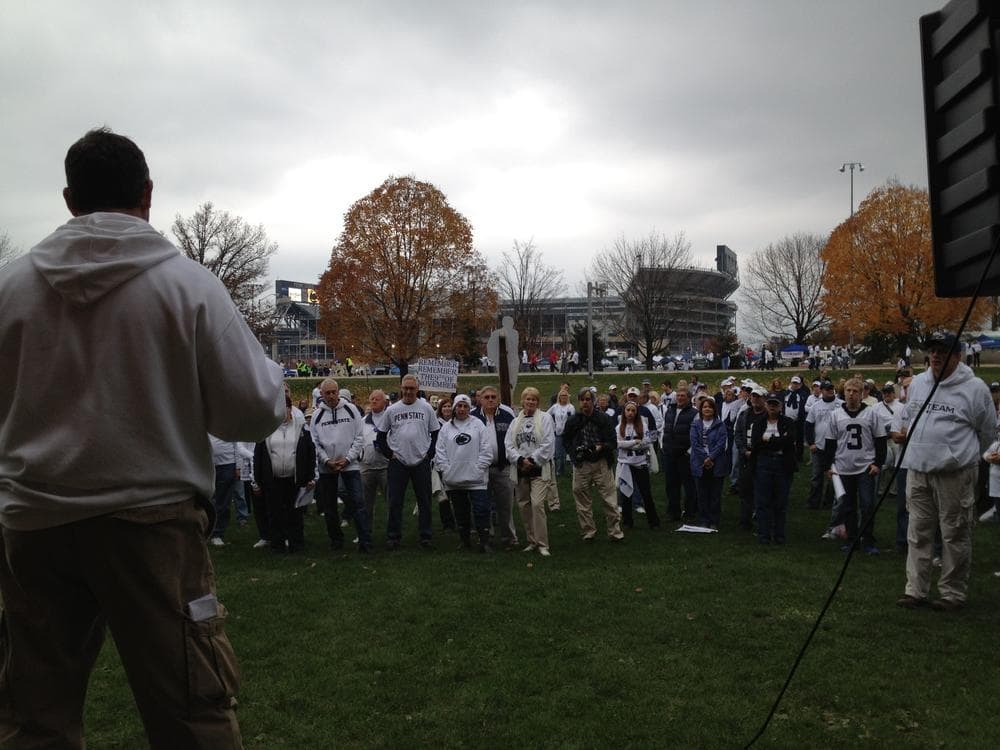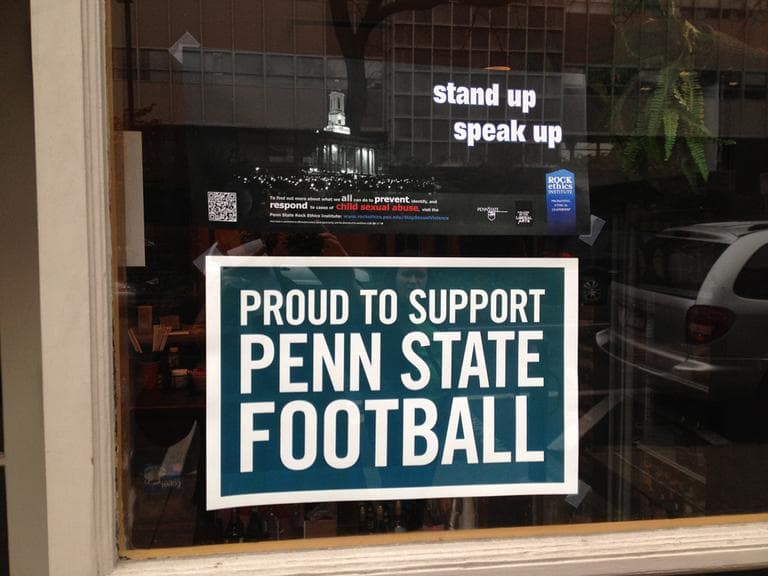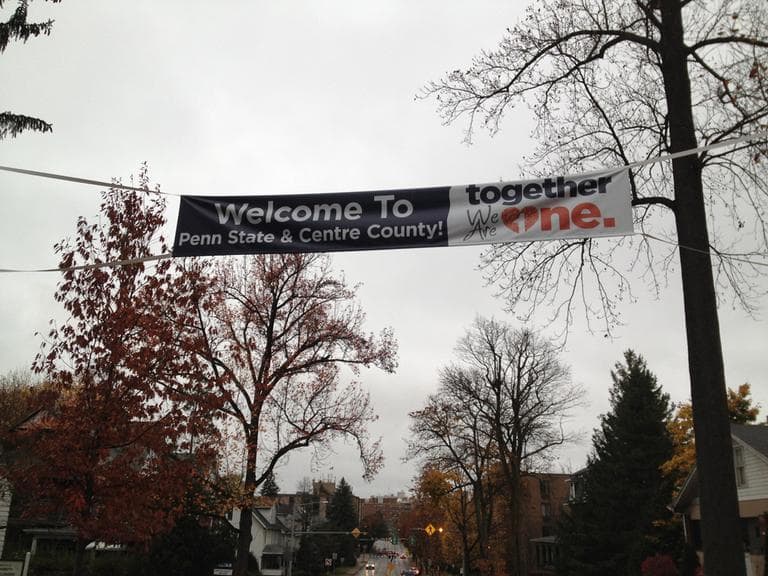Advertisement
Town At Center Of Sandusky Scandal Remains Divided

A year ago this Sunday, former assistant Penn State football coach Jerry Sandusky was indicted on dozens of counts of child sexual abuse. The next day, his dental-white head hung low as he turned himself over to authorities.
Over the next weeks and months the world was shocked to learn Sandusky had drawn his victims from his own charity for troubled youth, and that senior Penn State administrators may have known for a decade and done little or nothing.
Revered head coach Joe Paterno was fired and passed away shortly thereafter. There was a campus riot, a trial, dueling investigations — and living through it all, a town so entwined with the university that it’s named after it.
It also happens to be my town.
I was born in State College, Pa. I grew up there, went to college there, and recently I went back on the biggest game day of the season. I found a community deeply ambivalent about its role in a continuing drama that can only be described as Shakespearean.

The Namesake
This time last year I was living in Cambridge, Mass. working at WBUR. I woke up and opened my laptop to see a national news story datelined “University Park, Pa.”
Without reading another word, I was already upset. University Park is name of the campus, not the town! Imagine living in Orlando, Fl. and seeing a story datelined “Disney World.”
State Collegians have, in fact, a rich history of umbrage in this department. In 1953, when the Pennsylvania State College officially became a university, administrators asked the townspeople to rename their community accordingly. Via referendum, town rebuffed gown.
On top of that you’ve got all the sports journalists calling it “Happy Valley,” a moniker I suspect they invented solely for the cheap turns of phrase it offers, like: “Things aren’t so happy in Happy Valley as the Buckeyes lead the Nittany Lions 35-23.”
Advertisement
Plus there’s this little indignity we all suffer every time somebody asks us where we’re from. An old classmate of mine sums it up: “People go, ‘State College, is that the name of a town?’”
Leslie Yackeren and I were briefly an item in high school. Fifteen years later, her last name is Ratan and the interaction she describes will never be the same for either of us. Because now, as she explains, “when you say you’re from State College people go ‘oh, State College? OHHH, State College…’”
And how does one react to that? “Uh yes, I’m very ashamed” is Leslie’s not-quite-joking response.
When I first came back through State College after last Thanksgiving, it looked bombed out.
Fallen Semester
Last November we watched our hometown’s trinity of living patriarchs collapse in a matter of days; not just the Father, JoePa, but the Son, Jerry Sandusky. It’s hard to imagine now, but he was also a beloved figure — the myth stating he forsook the glory of his own head coaching gig to humbly serve his master and... the children.
The Holy Ghost was Graham Spanier, an ex- family therapist, who while serving as president of one of the world’s largest research universities for 16 years also served as adviser to the campus magicians club.
All three men, to varying depths, fallen.
When I first came back through State College after last Thanksgiving, it looked bombed out. A blue-painted sign on a tattered white bed sheet fluttered from the balcony of a student high rise: “We are STILL Penn State!” It was probably intended as an affirmation, but I read it like an SOS: “We’re still here! Get us out!”
But now it seems the indigenous wildlife has returned.
New Season
On the morning of the big game, PSU senior Brian Rayburg is on a couch, on a porch, with his bros, still drunk from the night before, shouting at passersby: “Hohhh, Hohhhh, Hohhhhh, LET’S GO STATE!”
Like Rip Van Winkle, it’s as though he slept through the whole drama.
The shirtless communications major demands an answer from the street: “Who woulda thunk it? We’re the favorite against Ohio State! Who woulda thunk it?!”

Despite crippling NCAA sanctions, the Nittany Lions have looked confoundingly unhobbled this fall. They’ve got a winning record going. My old Penn State professor and now friend, Paul Barsom, says this has restored some measure of normalcy.
“Things will go on,” Paul says. “Nobody knew if we could even have a football team without Joe Paterno here, right?”
On the other hand, Paul says the team’s success has functioned almost like an anesthesia or memory-erasing drug, resulting in a belief that “it doesn’t really matter about all of this stuff because hey, our football team is still doing well.”
A Sick Culture
As kickoff grows nearer, tailgaters in the shadow of Beaver Stadium shrug off yet another demonstration of angry Penn State alums.
Microphone in hand, Larry Schultz asks his modest assembly of well-fed baby boomers in Penn State sweatshirts: “Can you hear me in the back?” The enveloping masses of students listening to Def Leppard and playing cornhole can’t be bothered.
“I’d like to bring up our first speaker who’s gonna briefly recap for you 18 months of failure and mistakes by our board of trustees,” Shultz says, introducing fellow organizer Eileen Morgan. She proceeds to literally read the riot act against the board and new PSU president Rodney Erickson.
“Since the imposition of the sanctions there have been multiple occasions when Erickson and others have made statements which appear to suggest their acceptance as fact […] assertions that Penn State had a sick culture which emphasized athletics over academics,” Morgan proclaims, eyes down on her notes.
Does the community cower contritely until the air is cleared, or does it resist the narrative that all who’ve benefited from Penn State football are jointly complicit in one man’s atrocities?
“In fact the only place at Penn State with a culture problem is the board of trustees,” she reads. The crowd responds with pseudo-raucous cheers, evolving as such things often do into a call and response round of “We are!” “Penn State!”
Moving On
The refrain from Penn State administrators these last months has been “we need to move on.” The local chamber of commerce, whose members make their bread on busy football weekends, has put up signs and banners around town proclaiming “together we are one, moving forward.”
Still, there is deep division over what that means. Does the community cower contritely until the air is cleared, or does it resist the narrative that all who've benefited from Penn State football are jointly complicit in one man’s atrocities?
My old professor Paul is on the fence. “We just don’t know the facts,” he says.
“I feel pretty sure that when there’s a lot at stake, a lot of people who are vested in it will bend their ethics to justify protecting it,” Paul says, and he suspects that if “the truth” were known, it would probably look something like that.
“But,” he cautions, “we don’t really know.”
Indeed, despite a near constant stream purported revelations over the last year, not much actual investigation has been completed into how Jerry Sandusky got away with it for so long.
The trial focused on the abuser himself. The investigation Penn State commissioned from former FBI director Louis Freeh based its conclusions largely on anecdotal accounts from witnesses who were not under oath.
The aggrieved alumns from the demonstration think trustees got what they paid for with Freeh report: a version of history that heaps half the blame on those who've already lost their jobs while spreading the rest widely and thinly.
Paul points out that countless other criminal and civil cases are either pending or brewing.
“I don’t know when State College is ever gonna get to the point where you have a sense of ‘you remember when that thing happened?’" he says. “I think it’s probably gonna be 10 or 20 years before this is not gonna seem like the place that sheltered and protected a known pedophile. Or, is in denial about having done it.”
As the sun sets on game day, the students milling around down the hill from Paul’s house are having a semi-subdued Saturday night. Somewhere, some sports announcer is saying it: “The Buckeyes beat the Nittany Lions 35-23. Things aren’t so happy in Happy Valley.”
Adam Ragusea reports for Georgia Public Broadcasting in Macon. He tweets @aragusea.
This segment aired on November 2, 2012.